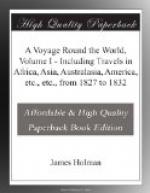The trade with the nations of the interior is chiefly confined to the Foulahs and Mandingoes, who bring small quantities of gold with them, which they exchange for European articles to carry home. Their mode of travelling to the colony is not a little curious. They first appoint one of their number as head man, who is referred to on every occasion, and who is answerable for the conduct of the whole. They generally come down in numbers of from six to thirty, and sometimes more. Each man carries on his head a kind of basket, made of the rattan cane, in which is contained his shirt, a calabash, some rice, and a bag made of sheep-skin, which holds the alcoran, some rice, bread, a knife, scissors, and other useful articles; also a small pouch in which they carry their gold, averaging about 5l. sterling each person. They secure the bag by fastening the sides of the basket together, and binding it round with strong twine which they make from grass. On the top of the basket they tie their bow and quiver of arrows loosely, so that they can get at them readily, in case they should be attacked in the woods by wild animals, or by any of the different tribes whose settlement they pass through in coming down. They also carry a bamboo cane about six feet long, and three inches in circumference, with a piece of iron, about six inches long, and sharp at the point, fixed into the end of it; this they make use of as a spear. They also carry a long knife or sword, which is slung over the arm by a belt. They partly live on the wild fruits of the country, and occasionally get something at the villages through which they pass; generally walking between the hours of six and ten in the morning, and two and six in the afternoon each day. When they arrive at Porto Logo, (which place is the termination of their land journey) they engage a canoe to take them to Freetown, for which they used to pay four dollars a head, but it is now reduced to one, and this charge they are accustomed to levy afterwards upon the merchant with whom they intend to deal, looking upon it as a bonus included in the traffic. They also apply to the merchants in Freetown, for accommodations during their stay, which is from ten days to a month. They will not trade either on the first or second day, but go round the town examining the different goods in the shops, and ascertaining the prices. In this preliminary proceeding they are assisted by their countrymen, who have been long resident in the colony and are acquainted with the English language. These interpreters make their living by cheating in every possible way, both the poor traveller and the merchant.




